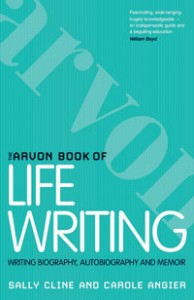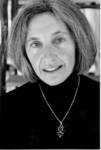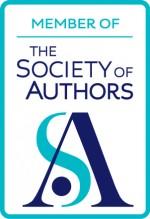 Just in case you hadn’t heard I’m writing the life story of Beatrice Cadbury, which I guess makes me a biographer! So I was thrilled that one of my birthday pressies recently was ‘The Arvon Book of Life Writing: Writing Biography, Autobiography and Memoir’ by Sally Cline and Carole Angier. Sally and Carole are biographers and teach Life Writing at the Arvon Foundation, and boy do they know their stuff. The coverage of this book is fantastic, because as well as their own wonderful wisdom there are guest contributions from over thirty writers, agents, and publishers. If you’re looking for a state-of-the-art textbook on Life Writing this is the one. It’s published by A & C Black and you can get hold of a copy from their website or buy it from the Arvon Shop.
Just in case you hadn’t heard I’m writing the life story of Beatrice Cadbury, which I guess makes me a biographer! So I was thrilled that one of my birthday pressies recently was ‘The Arvon Book of Life Writing: Writing Biography, Autobiography and Memoir’ by Sally Cline and Carole Angier. Sally and Carole are biographers and teach Life Writing at the Arvon Foundation, and boy do they know their stuff. The coverage of this book is fantastic, because as well as their own wonderful wisdom there are guest contributions from over thirty writers, agents, and publishers. If you’re looking for a state-of-the-art textbook on Life Writing this is the one. It’s published by A & C Black and you can get hold of a copy from their website or buy it from the Arvon Shop.
Now, as luck would have it, Carole Angier was the guest speaker at our recent National Academy of Writing end-of-year showcase. Carole gave an entertaining and inspiring talk about her own writing – she is best known for her biographies, ‘Jean Rhys: Life & Work’ and ‘The Double Bond: Primo Levi, A Biography’. I was so encouraged by what she had to say to new and emerging writers that I asked her if I could interview her for my blog. She very kindly said yes and had so much knowledge that I decided to split the interview into two parts.
INTERVIEW WITH CAROLE ANGIER: Part 1
Fiona: Congratulations Carole (and to your co-author Sally Cline) on the excellent ‘The Arvon Book of Life Writing’, and thank you for agreeing to let me interview you.
Q1. I have to ask this first. Traditional biography seems to be a hard sell in the current publishing climate, at least according to agent Andrew Lownie in his contribution to the book. Do you agree? How can biography evolve to keep and expand its audience? I rather liked his rallying cry for biographers, along with publishers, libraries, booksellers and arts organisations to “demonstrate the range and quality” of life writing today.
Carole: Alas yes, it does seem true that traditional biography – single-subject, cradle-to-grave literary or historical biography, complete with scholarly apparatus – is one of the victims of the current climate, along with literary novels and other kinds of ‘high-end’ publishing. The truth is that they were always loss-leaders: a cultural feather in the cap for publishers, but rarely money earners, since only devotees of the subject (or even more rarely, of the biographer) would be interested enough to read them. And now feathers in caps are no longer affordable.
Also there are fashions in books, as in everything else. Serious biography has actually been fashionable for a long time, thanks to wonderful writers like Michael Holroyd, Richard Holmes, Hilary Spurling and others. They are all as good as ever, but after a while people just want a change. Biography was in from the 70s through to the 90s; in the Noughties the taste moved to memoir, where I think it still is.
On the other hand, as I say in our book, writing is not market research: writers must write what they want to write, or we’ll have sold our souls for a mess of pottage. In fact, as Andrew Lownie says, many excellent biographies are still being published, there are more festivals and prizes than ever before, and biography is still the first genre to be reviewed in newspapers and magazines. Writing is not for the faint-hearted; and if we allow ourselves to be discouraged, the death of biography will be a self-fulfilling prediction. So if it’s what you want to write, don’t be deterred.
As to how it can evolve: you’ll see from my answers below (eg to Question 6) that I am not a huge fan of innovation – or not a fan of huge innovation – in these matters. I’ve experimented myself, interweaving short quest chapters with the main biographical story in my Primo Levi; and no one admires the greatest modern innovator in non-fiction, W.G. Sebald, more than me. But Sebald was a genius; I’m not sure many of us will be able to follow him, any more than we could follow Shakespeare or Eliot. Biographies may get shorter (see Question 2), and there may be more group biographies, and/or quest biographies, than before. But I do not think that biography can include a lot of invention – ie fiction – without breaking its contract with the reader. The trick is not to invent, and still write a gripping book. That’s how to keep our audience for biography.
Q2. Related to the above, on p 177 of the book you write “today the publishing world would rather have short biographies”. Is this to do with physical costs, or the belief that readers these days are time-poor, or perhaps both?
Carole: Yes – long books cost more, and people don’t want to pay more than the usual tenner. And yes, it’s to do with the belief that people don’t have the time for long books any more, or the concentration; and probably that belief is right, at least for the majority. On the other hand, look at the Harry Potter novels, or His Dark Materials: these are whopping great books, but bought in their millions by children, the most ADHD-affected part of our nation. So it’s not just length, obviously. The problem with long biographies is not that they’re long, but that they’re biographies. That is: they don’t allow people to indulge in fantasy, but require respect for the facts, and also for their limitations – for the recognition that no biography can be the whole truth, and that there are lots of things we’ll never know. People don’t like to read a whole long book and still feel it’s only giving them a partial vision. A short partial vision is OK; which may be one answer to your question.
Andrew Lownie says something very true about this too. He says that “the market is not for worthy and well-crafted portraits, but for something more immediate and personal. It’s bite-sized, Wikipedia gossip that interests us more than a view of the whole life.” Again, short biographies, and maybe slice-of-life rather than whole-life biographies, seem to be what’s called for – not just by the state of publishing, but by the state of the national psyche, formed by the cult of celebrity and the 3-minute attention span. Again, too, writers should lead, not follow, and if a longer, more traditional biography is what you want to write – go for it. But know what you are up against.
Fiona: Can we talk now about some of the practicalities of being a biographer?
Q3. I’m fascinated that you chose to learn Italian for your biography of Primo Levi. (I’m facing my own language hurdle as my biographee, Beatrice Cadbury, was married to a Dutchman and lived in Holland in her later life!) How essential was this for you and how much time did this add to your research?
Carole: Learning Italian was essential for me, because my subject was a writer, and I had to read him in the original. Also, he lived all his life in Italy (except for his one year in Auschwitz), and of all the hundreds of people I had to interview about him, only a handful spoke anything other than Italian.
Your case is completely different, fortunately! Beatrice Cadbury wasn’t a writer; she spent only her later life in Holland; and every Dutch person I’ve ever known speaks excellent English. So I think you’ll only need to read Dutch reasonably well, if there are Dutch books, letters, documents etc. about her. You’ll hardly need to learn to speak Dutch at all – which is good news, because I suspect it’s a lot harder than Italian. You could do what Hilary Spurling did for her (short!) biography of Pearl Buck: she learned enough Chinese to greet people politely, and take her leave politely, and that was it. (Unlike what she did with her school-girl French, for Matisse, which was to make it perfect.)
I spent a year doing nothing but reading Levi in the original, and doing Italian conversation once a week with a wonderful Professoressa who lived near me, in a village she called Grade Rorride (ie Great Rollright.) Of course when I got to Italy I was nowhere near ready to interview Levi’s friends, who were among the most distinguished intellectuals in Italy; but they were all extremely kind, and ignored my howlers. By the end of my two years there I spoke reasonable Italian – and then of course I came home.
I should add that Italian is truly possible to learn, especially if you did Latin at school, and already speak French, as I did. If Primo Levi had been Polish or Hungarian, I wouldn’t have dreamed of writing his biography.
Q4. Biographies have their own cost implications – time, travel, etc. The Arvon book includes a helpful list of funding organisations. Were you successful yourself in accessing any grants or external sources of funding, in addition to a publisher’s advance for example?
Carole: Yes. Despite a generous advance, I had to, because the whole process took 8 years – 3 years of research, and 5 of writing. I had a Winston Churchill Traveling Fellowship for my first year in Italy, and an Arts Council grant for my first year of writing. For the other 4 years of writing I had a Royal Literary Fund Fellowship, which meant two days a week teaching academic writing at Warwick University. These were all life-savers; but especially the RLF Fellowship, for which I was, and am, extremely grateful. The RLF educational fellowships help many established writers to stay afloat while they write; which is never easy, especially in research-intensive life writing.
I’ll be posting the second part of this interview next week. In the meantime if you have any questions or comments then it’d be great to hear from you.
Fiona Joseph



8 Comments
Hello Fiona, Enjoyed this interview very much – so positive and encouraging. I totally agree that it has to be a ‘gripping read’ and that way people will find their way to it whatever the size. Looking forward to the second instalment! best, t
Hi Tricia, thanks for stopping by and I’m really glad you enjoyed and were encouraged by Carole’s comments. Second instalment next week! Fiona
Hungarian! I have a friend who taught himself Hungarian… yes he is quite intimidating.
It’s the total immersion aspect of non-fiction that I love. It’s like method acting, reading the description above made me think of method acting… all that time spent “getting into the skin” of your character. Such an amazing experience.
Great blog, Fiona.
True about Hungarian – a very daunting language! I know about six words and that’s it. Dutch will be much easier.
Interesting take on writing lives and method acting… they *are* similar!
Glad you enjoyed the interview, Fed, especially as you missed Carole in person at the NAW show. How’s your own memoir going? Fiona x
How’s it going? Bless you.
I’m learning a lot fast… let’s leave it at that or I’ll be here all day.
Maybe I should blog it. (!)
x
Very interesting interview, Fiona. I’m looking forward to the second half. Your own project sounds interesting. How did you come across Beatrice Cadbury and want to write about her?
We’re all learning, Fed!
Hello Anna – it’s great to have you stopping by. I’ll post the second half of the interview on Tuesday so do come back then. The moment I came across Beatrice and the fact that she’d wanted to give her Cadbury inheritance back to the Cadbury workers I knew I had to write about her. It’s been a compulsion ever since to unravel that decision of hers!
Fiona x